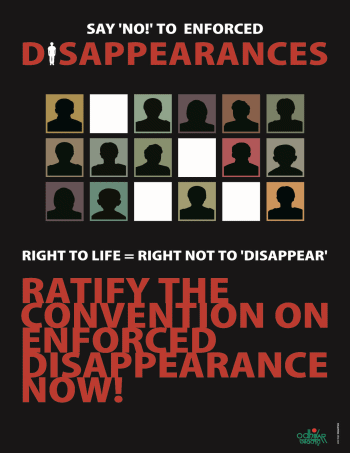Dhaka/Manila, 30 August 2019: The International Day of the Victims of Enforced Disappearances is observed globally on 30 August every year and this gives us the opportunity to remember the numbers of people who were disappeared due to armed conflict, war, occupation, xenophobia, authoritarianism and political turmoil; and to show solidarity with the victim-families. While commemorating this day, Odhikar and AFAD remember the victims of enforced disappearance and respect the struggles of the families of the disappeared persons around the world.
Enforced disappearance is regarded as a crime against humanity “when committed as part of a widespread or systematic attack directed against any civilian population, with knowledge of the attack” under the Rome Statute of the International Criminal Court and is not restricted to a specific region of the world. It has frequently been used by the state machineries as a strategy to silence the dissenting voices by spreading terror within the State or in a particular society. Cases of enforced disappearance in Bangladesh stem from the state’s need to silence dissent, for political vengeance or to create social injustice. Leaders and activists of the opposition political parties, demonstrators, rights activists, political analysts, academicians, journalists – anyone having a dissenting opinion or a critical voice against the government, is at a high risk of becoming a victim. The government is using repression against the opposition political activists and dissidents, who are speaking out against its undemocratic and anti-human rights actions. An alarming number of enforced disappearances have been committed after the Awami League-led Alliance government came to power in 2009 and it continues to increase over the years.
According to reported data collected by Odhikar, between January 2009 and July 2019, law enforcement agencies have been allegedly involved in at least 532 cases of enforced disappearances. Out of these cases, 68 people were found dead, 305 returned alive and/or were shown arrested in criminal cases. The whereabouts of 159 disappeared persons are still unknown. A majority of victims of enforced disappearance are opposition political activists and dissidents. Despite numerous and credible allegations from eyewitnesses and the families of the disappeared persons; and mounting evidence that the state security forces are allegedly involved, the government of Bangladesh has repeatedly denied such incidences and failed to conduct investigations to punish the perpetrators and recover victims. In many cases, victims of enforced disappearances have been released after being detained for a long time and then handed over to the police as being shown ‘arrested’ or produced before the Court after being falsely accused in criminal charges.
The resurfaced victims of enforced disappearance or their family members do not want to speak about their experience, out of fear of further disappearance, violence and threats. In some cases, bodies are found in different places and deaths are often explained as the result of ’crossfire’. The families of the disappeared persons suffer from the devastating consequences. Its traumatic effects extend to the victims’ next of kin, as it produces the severe anguish of not knowing the fate and whereabouts of the victims because of the continuous refusal of the State to acknowledge the acts of disappearance. In the context of Bangladesh, where most of those who were disappeared are men, the sufferings of the victims’ families are aggravated by economic hardship brought about by the sudden loss of the breadwinners.
Regrettably, the state institutions, including the judiciary and law enforcement have been purposely made dysfunctional and the state security forces have failed to protect the rights of the citizens. The justice mechanism and law enforcement agencies have been used by government for self-serving interests instead of upholding the rule of law. As a result, these institutions have failed to take any effective measure to investigate and prosecute the cases of enforced disappearance and provide remedies to the families of the disappeared persons.
Odhikar and AFAD urge the UN Human Rights Council (HRC) to engage with the authorities in Bangladesh, being a member of the HRC, to take effective measures to release all the victims of enforced disappearances. The UN HRC must persuade the government of Bangladesh to accede to the International Convention for the Protection of All Persons from Enforced Disappearance and implement recommendations made by the Member States on enforced disappearances in the Universal Periodic Review and during the CAT review.
Joint_Statement_IDD_Odhikar-AFAD (full text in English, PDF)




